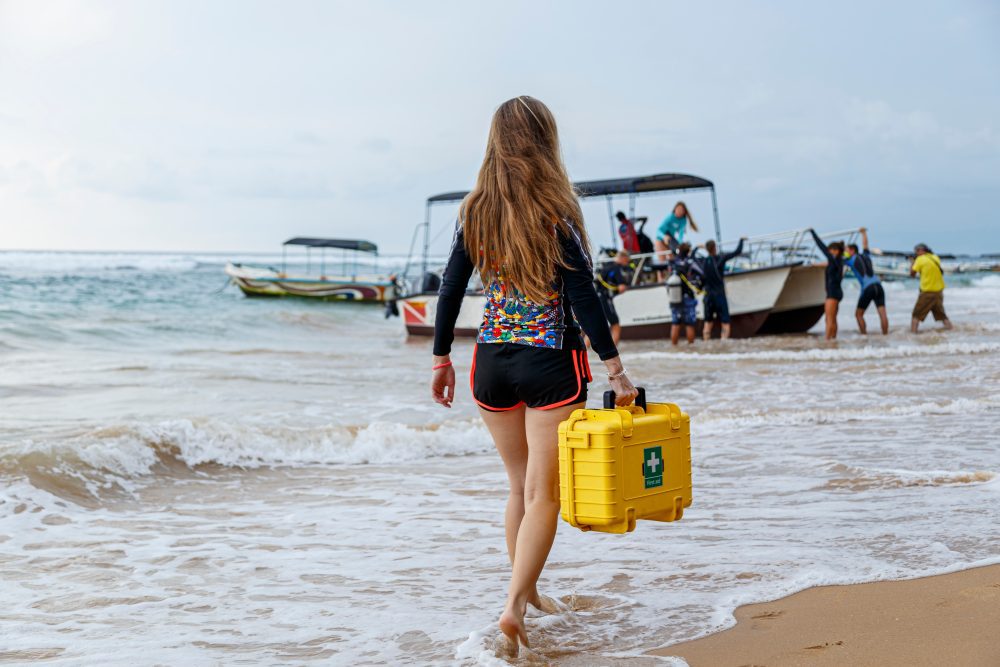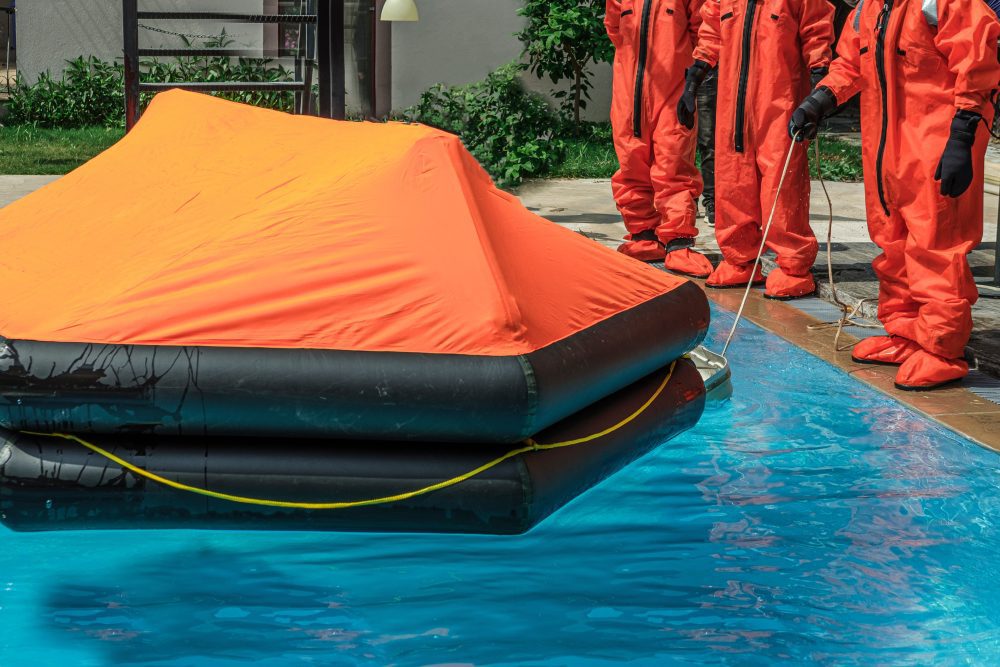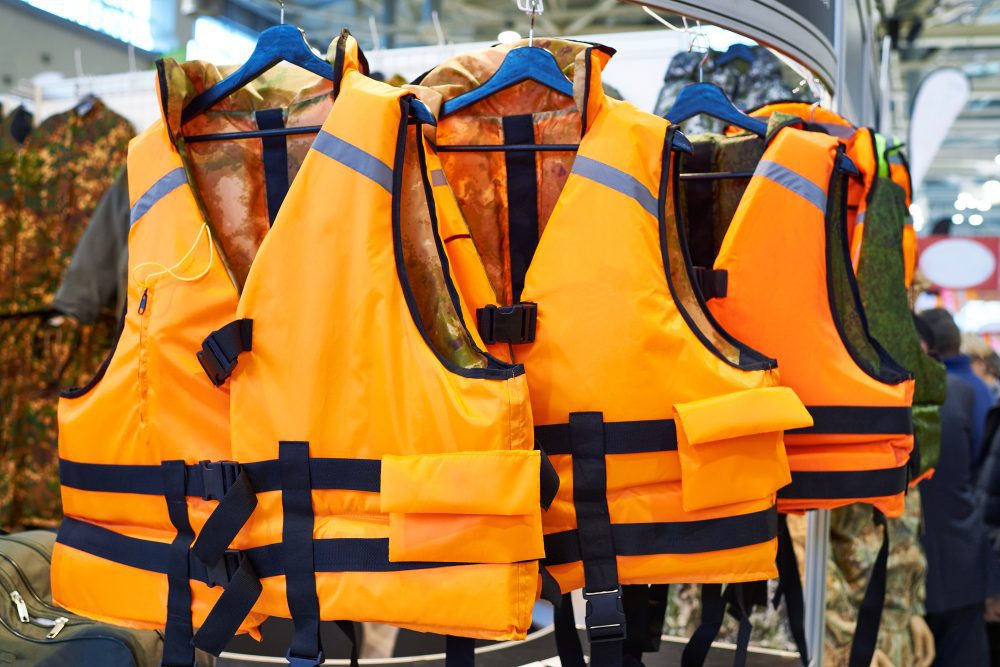While chartering a yacht is generally safe, that doesn’t mean there is no risk. Safety should always be of the utmost importance whatever you do; that goes for yachting too. It is true that when you charter a yacht, you are likely to have a crew who are highly experienced and trained to deal with any unforeseen circumstances. However, it is still a good idea to familiarise yourself with the safety equipment onboard, common risks, and what you can do to assist should anything unexpected occur during your yacht charter.
What are the benefits of taking a first aid course before chartering a yacht?
Understanding a little first aid can be extremely valuable, but it is necessary to note that first aid should not substitute professional medical assistance. If something goes wrong during your yacht charter, it is essential to seek help from medical professionals.
However, the risks of anything serious happening are dramatically reduced when everyone understands how to respond to accidents onboard a yacht charter. First aid knowledge provides passengers and crew with prompt medical attention when needed. Sailing trips do involve inherent risks, such as adverse weather conditions. When sailing, we are often in remote areas and access to medical facilities may be limited or delayed. Understanding the key skills needed to be the first responder in a medical emergency can prevent further harm when a person is injured and save lives in the most serious of situations.
Awareness of basic first aid procedures enhances the safety and well-being of everyone onboard. It is always important to be proactive in creating an environment where everyone is prepared for unlikely emergencies. This preparedness for unforeseen circumstances will maximise everyone’s enjoyment onboard your next charter.
First aid courses are usually finished in one session, so it is certainly worth it for the peace of mind you will gain. Life is full of unpredictability, so it is best to equip yourself to handle anything. It will allow you to focus on enjoying your sailing trips without any anxiety.

The most likely medical emergencies onboard a yacht charter
Before moving forward, it is essential to remind yourself that sailing yachts are generally a very safe place to be. However, some common injuries and illnesses can occur, and without ample knowledge on how to deal with these minor situations, it can create a major one. Here is a list of some of the more likely things to occur onboard a yacht charter:
- Impact injuries – The waves and winds might not always be forgiving onboard a yacht charter. Sometimes, sudden movements can knock you off balance or move equipment. This can result in being struck by something unexpected and cause bruising, contusions, or even fractures. Impact injuries usually happen during bad weather, docking, and anchoring.
- Cuts, abrasions, and lacerations – These injuries are likely to occur if you’re handling ropes, sharp objects, or in a confined space. They are usually minor and require minimal assistance, but that doesn’t mean they can’t vary in severity, so it is imperative to be prepared.
- Falls and Traumatic injuries – These are some of the more common injuries when on a sailing yacht. They usually occur when moving from deck to deck, descending and ascending stairs, or even using the restroom during rough conditions. 99% of the time, they require little to no medical attention, but if someone is extremely unfortunate, it can result in more serious injuries such as fractures or sprains.
- Motion-related illness – If you have suffered from motion sickness in the past, you will know that this common side-effect of sailing can make or break a holiday, so it is vital to know how to treat it.
- Sun and heat-related illness – When people are at sea, they spend more time in the sun than they are used to. Too much exposure to the sun can result in burning and even sunstroke. This will get everyone at least once in their lives, so being prepared and taking precautions is vital.

Precautions that should be taken to ensure a safe sailing trip
We know it may sound like a lot can happen onboard a chartered yacht, but it is crucial to understand that most of this can be avoided with a few simple steps before you set off on your trip. Most charters will already adhere to all of this, but it is good to know what you should expect.
- Pre-sailing safety briefing – There should be two safety briefings before any sailing trip on a chartered yacht. The first one will be for the crew to discuss the route and any emergency procedures, and then the second should be for the guests when they arrive onboard. Sometimes, you will also receive this via email or in paper format.
- First aid certified crew – In an ideal situation, every crew member should have undergone appropriate training for being at sea. This will ensure that all guests onboard are in very safe hands.
- Proper weather forecast and route planning – Understanding what weather lies ahead can mean avoiding nasty storms and making the sailing trip as relaxing as possible. A good crew will ensure that they have done their best to have a smooth trip.
- A list of emergency contacts – Everyone onboard a yacht should know all available emergency contacts. This should be visible in each section of the yacht. It is important to ensure these details are regularly updated, as emergency contacts can always change due to the location of your charter.
- Man overboard procedures – The charter crew will all be familiar with how to deal with someone falling overboard or struggling in the water. This is an infrequent occurrence, but it is crucial to have a plan in case it happens.
- Navigation and charting checks – The crew will also ensure that all navigation equipment onboard is in complete working order. This includes compasses, GPS systems, and Charts, and it will help with avoiding underwater obstructions and sailing through shallow waters.
- Regularly updated maintenance checks – All onboard equipment is also checked before departure; there will always be a record of this in the logbook. These checks drastically decrease the chances of anything going wrong onboard a yacht charter.

Safety equipment onboard a yacht charter
As well as the above precautions, there is also a large amount of safety equipment onboard a chartered yacht. All of this additional equipment will guarantee that there is less time for worrying and more time for pleasure on your next charter. Of course, depending on the size and purpose of the yacht, there may be different equipment, but here is a list of the basic equipment you should expect to find onboard.
- Life Jackets – There will always be more life jackets than necessary, and they should be placed conveniently around the yacht.
- First aid kits – There should be first aid kits in every section of the yacht.
- Harnesses and tethers – These are primarily for sailing, but they are used to ensure people don’t fall overboard during harsh weather.
- Floatation devices – These buoys assist anyone who might have fallen overboard.
- Fire extinguishers – There should always be ample fire extinguishers. Primarily in any cooking area and the main living space onboard the yacht.
- EPIRB – There will be a registered Emergency Position Indicating Radio Beacon which sends out the yacht location during any emergency.
- Radio – A VHF radio will always be onboard to communicate with other vessels and emergency services.
- Radar reflector – This allows the yacht to be seen on other radar screens.
- Navigation lights – These are essential for always maintaining visibility.
- Whistles and horns – In case of breakdowns or emergencies, these will be available to attract attention.
- Bilge pump – This pump can get rid of any water the yacht takes onboard.

Further reading
Simpson Yacht Charter is one of the world’s leading yacht charter companies with an extensive fleet around the globe, with extremely experienced and professional crews. Get in touch today, and we will be delighted to answer any questions that can help with your next sailing trip.






